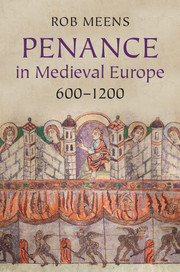Book contents
- Frontmatter
- Dedication
- Contents
- List of Figures
- Acknowledgments
- 1 Introduction
- 2 The late antique legacy
- 3 A new beginning? Penitential practice in the insular world
- 4 Insular texts on the move: penance in Francia and England
- 5 Penance and the Carolingian Reforms
- 6 New penitential territories: the tenth and eleventh centuries
- 7 The twelfth century
- Conclusion
- Appendix 1 The manuscripts of Theodore’s penitential
- Appendix 2 The manuscripts of the Excarpsus Cummeani
- Appendix 3 The manuscripts of the Bede and Egbert penitentials
- Appendix 4 The manuscripts of Halitgar’s penitential
- Sources
- Bibliography
- General index
- Manuscript index
- References
Conclusion
Published online by Cambridge University Press: 05 August 2014
- Frontmatter
- Dedication
- Contents
- List of Figures
- Acknowledgments
- 1 Introduction
- 2 The late antique legacy
- 3 A new beginning? Penitential practice in the insular world
- 4 Insular texts on the move: penance in Francia and England
- 5 Penance and the Carolingian Reforms
- 6 New penitential territories: the tenth and eleventh centuries
- 7 The twelfth century
- Conclusion
- Appendix 1 The manuscripts of Theodore’s penitential
- Appendix 2 The manuscripts of the Excarpsus Cummeani
- Appendix 3 The manuscripts of the Bede and Egbert penitentials
- Appendix 4 The manuscripts of Halitgar’s penitential
- Sources
- Bibliography
- General index
- Manuscript index
- References
Summary
In 1215 the Fourth Lateran Council decreed that every Christian who had come to the age of discretion should confess his sins at least once a year individually in front of his own priest. This decree is sometimes regarded as innovative for introducing regular lay confession, but it should rather be seen as the first general regulation on this topic in a centralizing Christian Church. There had been earlier rules concerning the frequency of confession, which was mostly closely related to receiving the Eucharist, sometimes requiring a higher rate of three times a year. Regino of Prüm had included among his demands for the laity that they should confess their sins at the beginning of Lent and fulfil their penitential obligations at least once a year. What was new was the way in which Innocent III now called together this enormous gathering of prelates and secular lords in order to formulate a truly formidable programme of reform that was to be applicable for all Christendom. The Fourth Lateran Council has been called ‘the most important statement of the nature and structure of the Catholic faith since the great ecumenical councils of late antiquity’, as well as ‘the most pastoral of all the general church councils of the Middle Ages’. Inspired by ideas about a much more active role of the church in society as they had been developing in Parisian circles, Lateran IV inaugurated a remarkable increase in the composition of pastoral works, a development that is sometimes referred to as a pastoral revolution. These works, many of which still need careful study, were meant to propagate the new ideas about penance and confession as they had developed in the twelfth-century schools to the priests and monks hearing confession and through them to communicate these to the laity. Penance, vices and virtues became the main subjects of a wealth of pastoral literature that was being produced in this period.
- Type
- Chapter
- Information
- Penance in Medieval Europe, 600–1200 , pp. 214 - 225Publisher: Cambridge University PressPrint publication year: 2014
References
- 1
- Cited by

